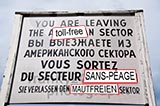
Now dig for your wallet
The Land of the Free
When it comes to car driving, Germany is an island of freedom in the heart of continental Europe. Not only does it offer you the chance to indulge your speed beast to your heart’s content at many autobahns, but also refrains from asking you to pay tolls or paste vignettes on your windshield to use its 13,000 km of Autobahns, more than 40,000 km of federal highways and around 600,000 km of other roads. (We are talking about car driving. Lorries have been subjected to toll charges for a couple of years now.)
Alas, in the island of freedom what’s free seems doomed. Its autobahns, once the envy of Europe, are in such a state of permanent constipation and less-than-sterling state of repair that flooring your gas pedal is becoming a rather rare luxury. Worse, road usage charges of one way or another appear to be on the way. Some studies show that about €10bn are needed to keep the road infrastructure in good shape, and only the €4.5bn of the lorry toll is specifically available for it. The thing is, only tolls may be earmarked for specific uses; taxes, on the contrary, go to general purposes.
Hence the proposal for collecting a yearly €100 special levy to finance road repair, put forth by Torsten Albig, the Minister-President of Schleswig-Holstein. Alas, it has been roundly rejected by all and sundry. And, although Germans have to pay tolls or fees as soon as they drive across almost any border while no foreign car drivers pay a cent for driving through Germany, Germans are up in arms at the mere whiff of tolls or vignettes in their own country. Is that a sign of selflessness towards their fellow Europeans?
Hardly. But to get to the bottom of it, the reasons being proposed for the road charge must be taken separately. For one, there is a need to finance the repair of the crumbling infrastructure. For another, there is a kind of reciprocity consideration: if we pay in just about every foreign country, why not have foreigners pay in our country. And for yet another, the externalities for driving, i.e. carbon emissions, noise, accidents and so on, are hardly covered by those causing them.
It’s not that German car drivers get off lightly as it is. They have to cough up a car ownership tax, a (stiff) petrol tax amounting to 65 cents per litre of petrol and 47 cents per litre of diesel, and a green tax (in addition to insurance and maintenance, but these have nothing to do with road maintenance). Altogether, no less than 48 percent of the federal tax revenue comes from motorised transportation. Motorists, and the ADAC, the club that lobbies for them, rightly point out that a large part of the taxes they pay is being siphoned off to cover other budget items, and not to keep the road infrastructure in good shape. They see no point in being milked even more.
They have a point. Still, that leaves out the rest of the externalities associated with driving, something on which everyone conveniently keeps mum. Any even half-serious analysis shows clearly that the current taxes and levies do not come even close to covering them.
That leaves the fact that, for a country so centrally located in Europe that zillions of foreigners drive across it every day, it is a wonder that it should be the only major one that does not charge any fee for using its infrastructure. Wouldn’t it make sense to introduce some kind of a toll or vignette system? Well, surely, but we’ve seen that the German drivers don’t want to pay a cent more. That would leave the foreigners driving on German roads as the only target.
But that, as it turns out, instituting a vignette that affects only non-residents would run afoul of the European Commission, which deems it an unacceptable discrimination against foreigners. Still, there have been some hints that extremely exceptionally—we never bend the rules, you understand—some elasticity might be applied in this case.
So far, the countries that refrain from applying blanket tolls or even tolls relative to road sections are rather smallish places—Andorra, Monaco, Liechtenstein, Luxembourg, Vatican City—or out of the way islands with no through traffic, such as Cyprus, Iceland and Malta. The second most generous are those collecting only special tolls for tunnels, bridges and the like, which includes just about everyone but the toll-free places listed above. All the rest, including almost all the majors, charge per road section, or a time-limited road usage fee that forces drivers to purchase a vignette. Whichever way you look at it, Germany is the odd man out.
Our guess? A vignette will come for Germany, sooner rather than later. So, do as many visiting Chinese do: choose a suitable autobahn and go burn some rubber while the going is still good.
